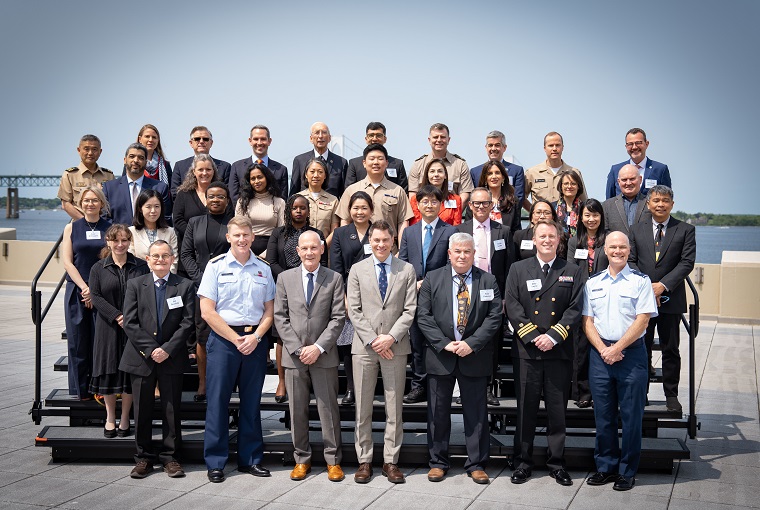Stockton Center for International Law Hosts Fifth Annual Alexander C. Cushing International Law Conference

Newport, R.I. - The Stockton Center for International Law (SCIL) at the U.S. Naval War College (NWC) held its fifth annual Alexander C. Cushing International Law Conference, a seminar series aimed at developing and shaping maritime laws and governance, onboard Naval Station Newport, May 23-25.
Co-sponsored by the Korea Institute of Ocean Science and Technology, the Japanese Maritime Self-Defense Force Command and Staff College, the University of Basel, and the U.S. Naval Justice School, the event brought together military judge advocates, scholars, and legal practitioners from more than 25 countries to analyze how international law and the future of naval warfare is potentially being shaped by ongoing geopolitical conflicts.
Special thanks and welcome were provided to the participants by Rear Adm. Shoshana Chatfield, president, NWC, who stated that the rule of law is the bedrock of security and stability across the maritime domain, and subsequently foundational to shared prosperity and innovation across the globe.
“Whether one's focus is military operations, the maritime transportation system, food security, the marine environment, or the intersection of emerging technologies and the maritime domain, international law is paramount for the safety and security of the world's oceans, hence our well-being as Nations and communities,” Chatfield said.
The conference began with opening remarks provided by Professor James Kraska, Chair, SCIL and Charles H. Stockton Professor of International Maritime Law at NWC.
“A major part of this conference is to think about the concept of integrated deterrence that’s reflected in the national defense strategy, which defines our views in international law,” Kraska commented, indicating that ensuring consistency with domestic and international laws is essential to operations in support of integrated deterrence. “The activities of our commanders should be guided by the rule of law, and we will have to navigate sometimes among competing legal obligations to develop and shape interpretations that provide commanders with operational flexibility.”
In its focus on refining and extending the application of international maritime law, SCIL’s “International Law: Conflict at Sea” event supports NATO’s 2022 Strategic Concept, the 2022 National Defense Strategy and the 2022 National Security Strategy. The conference specifically addressed these documents’ discussion of governing issues such as territorial integrity; human rights; shared values and vital interest in a free and open international system; and a refining of the rules related to technology, cyberspace, and outer space for artificial intelligence and autonomous weapons - and how these strategies may inform the choices of operational commanders.
Conference attendees participated in eight panels supported by over 30 speakers covering topics such as law of the sea & maritime security, marine environmental security, disruptive technology at sea and the law of armed conflict, Indo-Pacific maritime security, great power competition and law in the maritime domain, national security law and the U.S. military and the law of naval warfare.
Panel segments enabled a comprehensive understanding of issues trending within the maritime, air and space domains, and facilitated conversations between judge advocates tasked with preserving fundamental tenets of international law and managing new and existing maritime challenges.
Annually, the SCIL hosts legal research workshops on emergent issues, such as the Alexander C. Cushing International Law Conference, that invite input from many of the world’s leading international law experts and partner nation defense professionals. These workshops yield vital information and encourage a collaboration of ideas that help to shape legal interpretations affecting U.S. and partner nation forces around the world. Information from this conference will be published in international law studies to contribute to the concept of integrated deterrence in a tangible way.
A comprehensive body of information is also available via the recently published Newport Manual on the Law of Naval Warfare, a collaboration among NWC’s SCIL, Australia, Japan, Germany, India, and the UK, reflecting how maritime powers have applied the law during armed conflict. The Newport Manual is accessible online on SCIL’s International Law Studies website.
The SCIL operates under the auspices of the Center for Naval Warfare Studies (CNWS) at NWC, a globally recognized research institute producing original research and analysis of both international law and military operations. Its work is targeted to military leaders, national decision makers, and international law practitioners and scholars.
NWC delivers excellence in education, research, and outreach, informing today’s decision-makers and educating tomorrow’s leaders. The college provides educational experiences and learning opportunities that develop students’ ability to anticipate and prepare strategically for the future, strengthen the foundations of peace, and create a decisive warfighting advantage.
